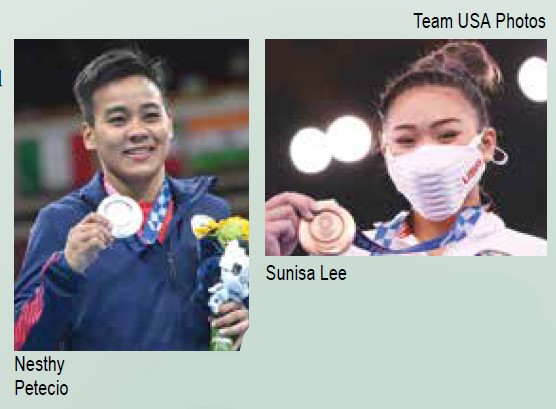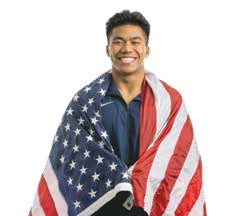
By John Lewis–
When Hmong-American Sunisa Lee took home gold as all-around women’s gymnastics champion, Cambodian-American Jordan Windle finished 9th in the men’s 10-meter platform diving competition, and openly LGBTIQ Filipinx boxer Nesthy Petecio won silver in women’s featherweight boxing at the 2021 Tokyo Olympics, I felt a special sense of excitement.
Over 40 years ago, I had the great fortune to work with refugees from the wars in Vietnam, Cambodia, and Laos—first in the U.S. and then at a camp in the Philippines. I taught refugees English as well as cultural elements and practical skills needed to adapt to life in America.
But I learned far more from the refugees and my Filipinx colleagues than I ever taught them. The connection we shared and the introduction they gave me to their cultures have been lifelong gifts to me.

I remember spending many hours listening to Cambodian refugees recount how they survived the Khmer Rouge genocide that ensued after the U.S. military departed Southeast Asia. They faced torture and starvation and had to overcome the murder of close family members and dear loved ones. Vietnamese refugees told their stories of years of war, escaping on boats under the cover of darkness, and staying alive as their rickety vessels traversed the South China Sea. After working in the camp in the Philippines, I visited the Hmong refugee camp in northeast Thailand, just across the Mekong River from their home country Laos. Many of the refugees risked their lives as they crossed the river to safety.
Sunisa Lee is the first Hmong American and presumably the first Hmong person to win an Olympic medal. Jordan Windle is the first Cambodian American to compete for the U.S. in the Olympics. Windle, born in Cambodia, was orphaned as an infant and suffered from serious malnutrition and illness when he was adopted by an openly gay man from the U.S. Now, he’s the proud son of an openly gay father and his husband, another Olympic feat.

Windle is a vocal advocate for LGBTIQ and other marginalized people. He’s already working to help youth in his native Cambodia find opportunities. Upon her victory, Petecio declared: “This win is for the LGBTQ community. Let’s go, fight!” I feel truly proud of all of them.
Lee, Windle, and Petecio’s presence at the Olympics also serves as a reminder of the grave consequences of war. Neither Lee nor Windle would have competed as Americans had the U.S. military not been a pivotal force in the horrendous wars in Southeast Asia in the 1960s and 70s that cost millions of lives. I’ll never forget as an 11-year-old boy watching President Richard Nixon on national television announce the 1970 U.S. troop invasion of Cambodia, following over a year of secret bombing.
Hmong people had lived for millennia in tightknit isolated communities in the mountains of Laos. In the 1960s, the CIA recruited thousands of them to fight a secret war against communists in Laos. The death rate of Hmong soldiers was 10 times that of American soldiers in Vietnam. Between 1964 and 1973, the U.S. dropped more bombs on the nation of Laos than all the bombs dropped in World War II, making the tiny country the most bombed country in world history.
The Philippines were ruled by Spanish colonists for over 300 hundred years, then possessed as a territory of the U.S. for forty years, and occupied by the Japanese military during World War II, before gaining independence in 1946. Today, the Philippines still struggles to overcome the legacy of hundreds of years of occupation.
And a 29-member team consisting entirely of current refugees competed in the Tokyo Olympics as they did in Rio in 2016.
We must ask Bob Dylan’s question: “How many times must the cannonballs fly, before they’re forever banned?”
At the same time, we must take hope in the triumphs of Lee, Windle, and Petecio, and how their presence serves as an example that things can change for the better.
My dad and Stuart’s dad both fought against the Japanese military as part of the U.S. Army in the Philippines in 1945. Over 75 years later, we teach about marriage equality and LGBTIQ rights to Japanese university students, studying in the Olympic host city Tokyo, a place we love. As young soldiers, our fathers would never have imagined such a thing to be possible.
Although we all must participate in truth, reconciliation, and reparation for the present-day effects of the past, we don’t have to continue to live out the conflicts, hatred, and wars that previous generations enacted. Lee, Windle, and Petecio were born at the turn of a new century. Their Olympic triumphs symbolize what may be possible if we want it collectively as a global society—and are willing to undertake the dedication and effort that the three of them did to achieve their Olympic glory.
Stuart Gaffney and John Lewis, together for over three decades, were plaintiffs in the California case for equal marriage rights decided by the California Supreme Court in 2008. Their leadership in the grassroots organization Marriage Equality USA contributed in 2015 to making same-sex marriage legal nationwide.
Published on August 12, 2021
Recent Comments